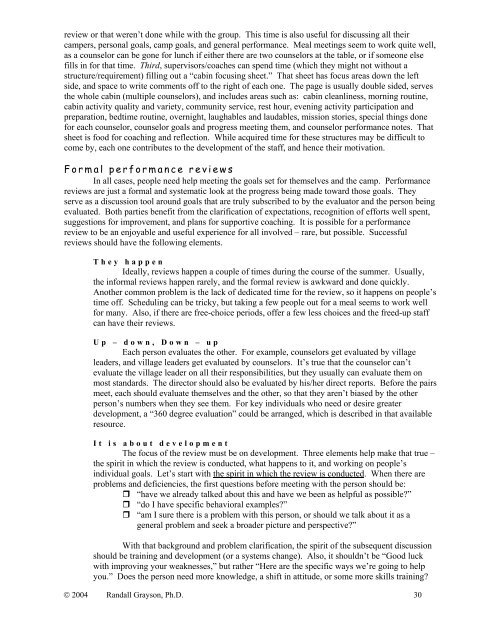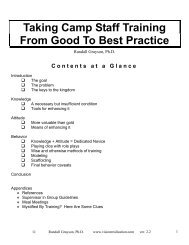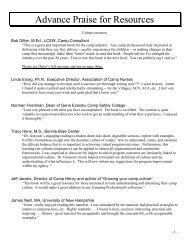Staff motivation - Vision Realization
Staff motivation - Vision Realization
Staff motivation - Vision Realization
You also want an ePaper? Increase the reach of your titles
YUMPU automatically turns print PDFs into web optimized ePapers that Google loves.
eview or that weren’t done while with the group. This time is also useful for discussing all their<br />
campers, personal goals, camp goals, and general performance. Meal meetings seem to work quite well,<br />
as a counselor can be gone for lunch if either there are two counselors at the table, or if someone else<br />
fills in for that time. Third, supervisors/coaches can spend time (which they might not without a<br />
structure/requirement) filling out a “cabin focusing sheet.” That sheet has focus areas down the left<br />
side, and space to write comments off to the right of each one. The page is usually double sided, serves<br />
the whole cabin (multiple counselors), and includes areas such as: cabin cleanliness, morning routine,<br />
cabin activity quality and variety, community service, rest hour, evening activity participation and<br />
preparation, bedtime routine, overnight, laughables and laudables, mission stories, special things done<br />
for each counselor, counselor goals and progress meeting them, and counselor performance notes. That<br />
sheet is food for coaching and reflection. While acquired time for these structures may be difficult to<br />
come by, each one contributes to the development of the staff, and hence their <strong>motivation</strong>.<br />
Formal performance reviews<br />
In all cases, people need help meeting the goals set for themselves and the camp. Performance<br />
reviews are just a formal and systematic look at the progress being made toward those goals. They<br />
serve as a discussion tool around goals that are truly subscribed to by the evaluator and the person being<br />
evaluated. Both parties benefit from the clarification of expectations, recognition of efforts well spent,<br />
suggestions for improvement, and plans for supportive coaching. It is possible for a performance<br />
review to be an enjoyable and useful experience for all involved – rare, but possible. Successful<br />
reviews should have the following elements.<br />
They happen<br />
Ideally, reviews happen a couple of times during the course of the summer. Usually,<br />
the informal reviews happen rarely, and the formal review is awkward and done quickly.<br />
Another common problem is the lack of dedicated time for the review, so it happens on people’s<br />
time off. Scheduling can be tricky, but taking a few people out for a meal seems to work well<br />
for many. Also, if there are free-choice periods, offer a few less choices and the freed-up staff<br />
can have their reviews.<br />
Up – down, Down – up<br />
Each person evaluates the other. For example, counselors get evaluated by village<br />
leaders, and village leaders get evaluated by counselors. It’s true that the counselor can’t<br />
evaluate the village leader on all their responsibilities, but they usually can evaluate them on<br />
most standards. The director should also be evaluated by his/her direct reports. Before the pairs<br />
meet, each should evaluate themselves and the other, so that they aren’t biased by the other<br />
person’s numbers when they see them. For key individuals who need or desire greater<br />
development, a “360 degree evaluation” could be arranged, which is described in that available<br />
resource.<br />
It is about development<br />
The focus of the review must be on development. Three elements help make that true –<br />
the spirit in which the review is conducted, what happens to it, and working on people’s<br />
individual goals. Let’s start with the spirit in which the review is conducted. When there are<br />
problems and deficiencies, the first questions before meeting with the person should be:<br />
“have we already talked about this and have we been as helpful as possible?”<br />
“do I have specific behavioral examples?”<br />
“am I sure there is a problem with this person, or should we talk about it as a<br />
general problem and seek a broader picture and perspective?”<br />
With that background and problem clarification, the spirit of the subsequent discussion<br />
should be training and development (or a systems change). Also, it shouldn’t be “Good luck<br />
with improving your weaknesses,” but rather “Here are the specific ways we’re going to help<br />
you.” Does the person need more knowledge, a shift in attitude, or some more skills training?<br />
© 2004 Randall Grayson, Ph.D. 30





